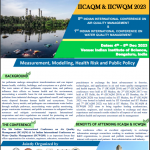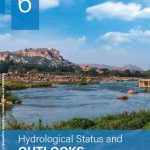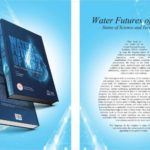Assessment of the Seasonal Dynamics and Links with Environmental Change of the Carbon Use Efficiency of Indian Terrestrial Ecosystems
| Name of the Speaker | Abishek Chakraborty |
| Title of the Seminar | Assessment of the Seasonal Dynamics and Links with Environmental Change of the Carbon Use Efficiency of Indian Terrestrial Ecosystems |
| Date &Time | 17 May 2022 (Tuesday) at 5 PM |
| Venue | Lecture Hall, ICWaR |
Abstract: Global vegetation acts as a significant atmospheric carbon sink by converting atmospheric carbon dioxide to biomass. The efficiency of this conversion is termed the vegetation carbon use efficiency (CUE). It quantifies the carbon storage as useful biomass in the vegetation. It is defined as the net to gross primary productivity (NPP/GPP) ratio. CUE assessment is vital for policymakers as it helps plan future carbon sequestration strategies. Earlier studies have depicted the variation of CUE either using process-based models or satellite data for annual temporal scale (Chen and Yu, 2019, Sci Rep; El Masri et al., 2019, Sci Rep). Another study depicted the driving role of climatic factors on the CUE globally (He et al., 2018, Agr Forest Meteorol). However, the impact of meteorological, vegetation, aridity, and anthropogenic factors on the CUE of India’s terrestrial ecosystems at sub-annual (seasonal, sub-seasonal transitional, and monthly) temporal scales is seldom addressed.
This study utilizes the Moderate Resolution Imaging Spectroradiometer (MODIS) products of GPP and the net photosynthesis to produce CUE of India’s terrestrial ecosystems at the finer temporal scales (relative to annual scale), i.e., for the four seasons of India (winter, summer, monsoon, post-monsoon), the sub-seasonal transitions (wet and dry season transitions), and the twelve months. We analyze the CUE variation at the spatial scales of the country, homogeneous meteorological regions, provinces, land classes, and the Koppen climate zones from 2000 to 2021. We further discriminate the relative impacts of each environmental driver on the CUE variation of India’s terrestrial ecosystems at these spatial and temporal scales. This study demonstrates the emergent responses of the carbon storage dynamics of Indian terrestrial ecosystems to its environmental drivers and can guide policymakers in ecological restoration.
Date/Time
Date(s) - 17/05/2022
5:00 pm - 6:00 pm















